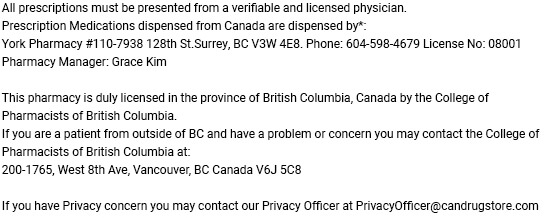Description
Indications
Procyclidine is utilized to address symptoms associated with Parkinson’s disease or involuntary movements triggered by the side effects of specific psychiatric drugs. This medication belongs to the anticholinergic class, acting by inhibiting the action of a natural substance called acetylcholine. This mechanism helps alleviate muscle stiffness, reduce sweating, decrease saliva production, and enhance walking ability in individuals with Parkinson’s disease. Anticholinergics like procyclidine are also effective in halting severe muscle spasms in the back, neck, and eyes, which can sometimes result from psychiatric medications.
Uses and Dosage
Take this medication orally as instructed by your doctor, usually 3 to 4 times a day after meals and at bedtime. Your doctor might initiate treatment with a low dose, gradually increasing it to determine the most effective dose for you. The prescribed dosage is contingent upon your medical condition and your response to the treatment.
If you’re using the liquid form of this medication, measure your dose with a specialized measuring spoon or device. Avoid using a regular household spoon, as it may not provide the accurate dose.
Consistency in taking this medication is crucial for deriving maximum benefits. To aid in remembering, take it at the same times each day.
Take this medication at least 1 hour before antacids containing magnesium, aluminum, or calcium. Allow at least 1-2 hours between doses of procyclidine and certain drugs for diarrhea (adsorbent antidiarrheals like kaolin, pectin, attapulgite).
Take this medication at least 2 hours after ketoconazole. Antacids and certain diarrhea medications may impede the full absorption of procyclidine, and this product may hinder the complete absorption of ketoconazole if taken simultaneously.
If this medication is prescribed for side effects from another medication, your doctor may instruct you to take it regularly or only as needed. For Parkinson’s disease, if you are taking this medication, your doctor might adjust the dose of your other medications (such as levodopa). Follow your doctor’s instructions closely and refrain from stopping or altering the dose of your medication without approval.
While this medication is beneficial for many individuals, it may carry a risk of addiction, particularly if you have a history of substance use disorder. Avoid increasing the dose, taking it more frequently, or using it for a longer duration than prescribed. Cease the medication as directed and do not abruptly discontinue it, as certain conditions may worsen when the drug is suddenly stopped. Your doctor may gradually reduce your dose if necessary.
For prolonged use, the effectiveness of this medication may diminish, and alternative dosing may be required. Discuss with your doctor if you notice a decline in its efficacy.
Side Effects
Some side effects may occur that usually do not need medical attention:
- drowsiness
- dizziness
- lightheadedness
- constipation
- flushing
- nausea
- vomiting
Inform your healthcare provider immediately if you experience any serious side effects:
- decreased sexual ability
- severe stomach/abdominal pain
- difficult/painful swallowing
- difficulty urinating
- weakness
- chest pain
- severe dizziness/fainting
- high fever
- fast/irregular/slow heartbeat
- mental/mood changes
- eye pain/swelling/redness
- vision changes
Caution
- Before taking procyclidine, inform your doctor or pharmacist about any allergies you may have, as this medication may contain inactive ingredients that can cause allergic reactions or other issues.
- Share your medical history with your doctor or pharmacist, especially if you have a history of glaucoma, breathing problems, diarrhea caused by infection, heart problems, high/low blood pressure, stomach/intestinal issues, kidney disease, liver disease, mental/mood problems, certain muscle diseases (myasthenia gravis), certain nerve diseases (autonomic neuropathy), seizures, stroke, overactive thyroid (hyperthyroidism), difficulty urinating, or a personal or family history of substance use disorder.
- Procyclidine may cause dizziness, drowsiness, or blurred vision. The use of alcohol or marijuana can intensify these effects. Avoid driving, using machinery, or engaging in activities requiring alertness or clear vision until you can do so safely.
- This medication reduces saliva production, potentially leading to dental problems like cavities and gum disease. Maintain good dental hygiene, including regular brushing and flossing, and schedule routine dental check-ups.
- Procyclidine can decrease sweating, potentially causing a severe rise in body temperature (hyperthermia). The risk of this side effect increases in hot weather, during vigorous exercise, and/or with alcohol consumption. Stay well-hydrated, dress lightly in hot weather, and avoid excessive alcohol intake. Seek medical attention promptly if you experience signs of hyperthermia, such as mental/mood changes, headache, or dizziness.
- Liquid forms of this medication may contain alcohol. If you have diabetes, alcohol dependence, or liver disease, exercise caution. Some medications, like disulfiram and metronidazole, may cause a serious reaction when combined with alcohol.
- Inform your doctor if you are taking any medication that should not be used with alcohol.
- Older adults may be more sensitive to the side effects of this drug, particularly dizziness, heat stroke, memory problems, and constipation. Children may also be more sensitive, especially to the effects on heart rate.
- During pregnancy, use this medication only when clearly needed and discuss the risks and benefits with your doctor.
- It’s unknown if this drug passes into breast milk. Consult your doctor before breastfeeding.
Form and Strength
Kemadrin is available in the following forms and strengths:
- Kemadrin tablet:
- 2.5 mg
- 5 mg
- procyclidine tablet:
- 5 mg
FAQ
Is Kemadrin addictive?
Though it helps many people, this medication may sometimes cause addiction. This risk may be higher if you have a substance use disorder.
How does Kemadrin make you feel?
Kemadrin may make you feel tired or dizzy when you start taking it. It will also slow down your reaction time.
Resources
- https://www.youngminds.org.uk/young-person/medications/procyclidine/#:~:text=Taking%20procyclidine%20may%20make%20you,slow%20down%20your%20reaction%20time
- https://www.rxlist.com/kemadrin-drug.htm
- https://www.healthlinkbc.ca/medications/procyclidine-oral
- https://www.webmd.com/drugs/2/drug-14106/kemadrin-oral/details
- https://www.drugs.com/cdi/procyclidine-tablets.html


 Prescription Required
Prescription Required  Formulation :
Formulation : 




